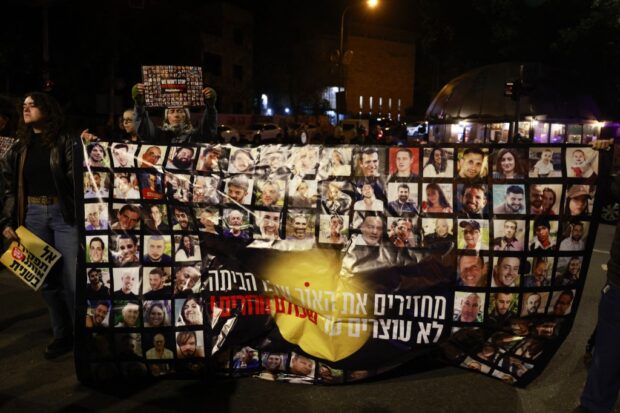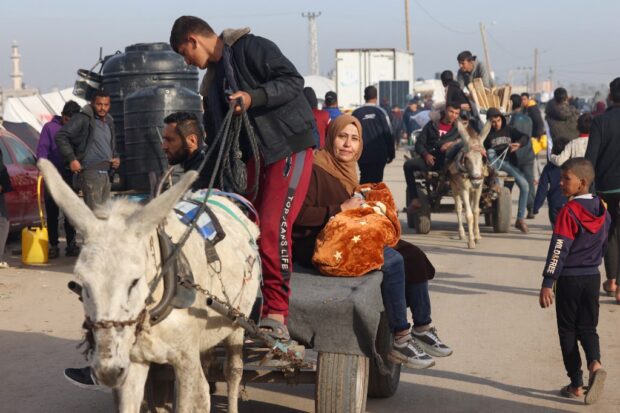As Gaza deaths top 25,000, Hamas defends attacks that sparked war

Relatives and supporters of Israeli hostages held in Gaza since the October 7 attacks by Hamas in southern Israel rally near the residence of the Israeli prime minister in Jerusalem on January 21, 2024, to call for their release. Israeli Prime Minister Benjamin Netanyahu said on January 2, he had rejected conditions demanded by Hamas militants for the release of hostages, hours after the group released a report justifying its October 7 attack on Israel. (Photo by Menahem Kahana / AFP)
Palestinian Territories — Palestinian militant group Hamas on Sunday defended its October 7 attacks against Israel but admitted to “faults” and called for an end to “Israeli aggression” in Gaza, where the health ministry said the death toll passed 25,000.
Southern Gaza is the latest focus of Israel’s battle to destroy the Islamist group responsible for the deadliest attack in the country’s history.
READ: Israeli soldiers uncover Gaza tunnel that once held hostages -army
In its first public report on the attacks that began the war, Hamas said they were a “necessary step” against Israeli occupation of Palestinian territories and a way to secure the release of Palestinian prisoners.
Israeli Prime Minister Benjamin Netanyahu later vowed “complete victory” and said his government would not accept Hamas’s conditions for releasing hostages still held in Gaza.
Hamas’s 16-page report admitted, “some faults happened… due to the rapid collapse of the Israeli security and military system, and the chaos caused along the border areas”.
Article continues after this advertisementThe war began when gunmen broke through Gaza’s militarized border to attack Israelis and foreigners in the streets, in their homes and at an outdoor rave party.
Article continues after this advertisementThis resulted in the deaths of about 1,140 people, mostly civilians, according to an AFP tally based on official Israeli figures.
Accounts of sexual violence emerged but the scarcity of survivor testimonies and a lack of forensic evidence made it difficult to assess their scale.
Militants seized about 250 hostages during the attacks, and Israel says around 132 remain in Gaza.
Dead hostages
The army announced the death of another soldier in the October 7 attacks and said his body remains in Gaza.
This brings to 28 the number of dead captives still in the Palestinian territory, according to an AFP tally based on Israeli data.
Hamas — considered a “terrorist” group by the United States and European Union — said in the report that its fighters were committed to “Islamic values”, and if civilians were targeted “it happened accidently and in the course of the confrontation with the occupation forces.”
It called for Israel to be held “legally accountable” for Palestinian suffering and urged “popular pressure around the world until ending the occupation.”
In response to the attacks, Israel launched a military offensive that has killed at least 25,105 people in Gaza, mostly women and children, according to the health ministry in Hamas-run Gaza.
Netanyahu is under intense pressure to return the hostages and account for security failings surrounding the October 7 attacks.
Relatives and supporters of the hostages on Sunday again rallied for their return home, near Netanyahu’s residence in Jerusalem.
In a video statement released after the Hamas report, Netanyahu said that “in exchange for the release of our hostages, Hamas demands an end to the war, the withdrawal of our forces from Gaza,” the release of Palestinian prisoners and guarantees that Hamas would stay in power.
“If we accept this, our soldiers have fallen in vain,” and security would not be guaranteed, Netanyahu said.
United Nations agencies have warned of famine and disease as Gazans, 1.7 million of whom are displaced, struggle with shortages of water, medical care, and other essentials during daily bombardment.

Displaced Palestinians use a donkey cart for transportation at a makeshift tent camp in Rafah near the border with Egypt in the southern Gaza Strip on January 21, 2024 amid the ongoing conflict between Israel and the Palestinian militant group Hamas. (Photo by AFP)
Donkey carts
With fuel scarce, they have increasingly turned to donkey carts for transport.
“Anyone who used to own a car now uses a donkey. Even businessmen or officials try to collect money just to buy a donkey,” said Badr al-Akhras, a trader of the beasts.
Diplomatic efforts have sought scaled-up aid deliveries for Gaza and a truce after a week-long cessation of hostilities in November saw Hamas release dozens of hostages in exchange for Palestinian prisoners held by Israel.
On Sunday 260 humanitarian aid trucks were transferred to Gaza, according to COGAT, the Israeli defence ministry body responsible for Palestinian civilian affairs.
On Friday, the UN reported 288 trucks had entered, but the figures are far below pre-war levels.
Hamas’s Qatar-based chief, Ismail Haniyeh, met with Turkey’s foreign minister to discuss the conflict and humanitarian aid, diplomatic sources said on Sunday.
The United States, Arab countries and other governments are seeking a solution involving Palestinian statehood, but Netanyahu has rejected it, saying “Israel must retain security control over Gaza”.
The Hamas report rejected any international and Israeli efforts to decide Gaza’s post-war future.
The war has spurred fears of a wider escalation, with Israel’s northern border with Lebanon seeing near-daily exchanges of fire between Israeli forces and the Iran-backed Hezbollah movement.
An Israeli strike Sunday in south Lebanon killed a Hezbollah fighter, a source close to the group told AFP, with a security official describing the target as a high-level commander who survived.
Israel said its warplanes again bombed Hezbollah targets in southern Lebanon.
The White House said it was taking “extremely seriously” a weekend attack by Iran-backed militants using “multiple ballistic missiles and rockets” against a base hosting US forces in Iraq.
Dozens of such attacks in Iraq and Syria have occurred since mid-October. Most have been claimed by Iran-linked militants opposing US support for Israel, but the use of ballistic missiles marked an escalation.